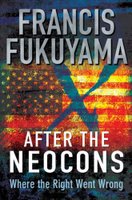St Francis bites his own Animals
 Is there any commentator more regularly misjudged and misquoted than Fukuyama? His 1992 magnum opus The End of History and the Last Man has been the launching pad for innumerable opinion pieces, most structured along the lines of "ho ho ho, silly old Fuku-san thought history was over, but hey, he was wrong!"
Is there any commentator more regularly misjudged and misquoted than Fukuyama? His 1992 magnum opus The End of History and the Last Man has been the launching pad for innumerable opinion pieces, most structured along the lines of "ho ho ho, silly old Fuku-san thought history was over, but hey, he was wrong!"Actually, he's not such a soft target. EOH is not an easy read, but it repays the effort, and offers a genuinely thoughtful and at the time fairly novel proposition: that there is now a broad global consensus, right across the political spectrum, that liberal democracy, capital markets and competition work better than any other known system. So it is history in the Hegelian and Marxist sense of the word which he proposes has come to a conclusion rather than all human history, as his sillier detractors imply.
Even if you do not agree with him, it's a thought provoking idea, and who is to blame an author of a fairly abstruse work for dreaming up a catchy title.
Anyway, this is his latest effort, published a few weeks ago - bought in Oxford St, London, with the flashy cover you see above. Amusingly, in the US it has a sober black cover and an alternative title America at the Crossroads
So FF's nose for a catchy title or two, tailored to the local market, is still in fine working order.
This one is much more readable. Success and fame have brought in their wake better prose - pointed, concise and with a refined sense of humour lacking before. Fukuyama claims, perhaps with some justification, that his ideas became part of the intellectual apparatus of the neoconservative administration of George Bush. He now wishes to formally repudiate the association, and mounts a ferocious critique of his government's current foreign policy and ideology.
This brief monograph (just over 190 pages of large double spaced type plus critical apparatus) traces the early history of neoconservatism as a school of thought, then explains how its ideas, perhaps not that intrinsically smart to start with, have been systematically altered and debased by the current rulers of America.
He concludes with a couple of chapters of positive suggestions, one on alternative and more effective global institutions, and one on American foreign policy.
The reader may mutter, well, well, easy enough to be an armchair critic and theorist, of course, (but is it really that easy?) Nevertheless, the views which emanate from Fukuyama's cosy upholstery at Yale are always a cut or two above the average, and usually do merit thoughtful reading and debate, never more so than here, where we can all enjoy the rare enough spectacle of one of the most celebrated and respected conservative theorists decisively distancing himself from the increasing global catastrophe that is George Bush abroad.
